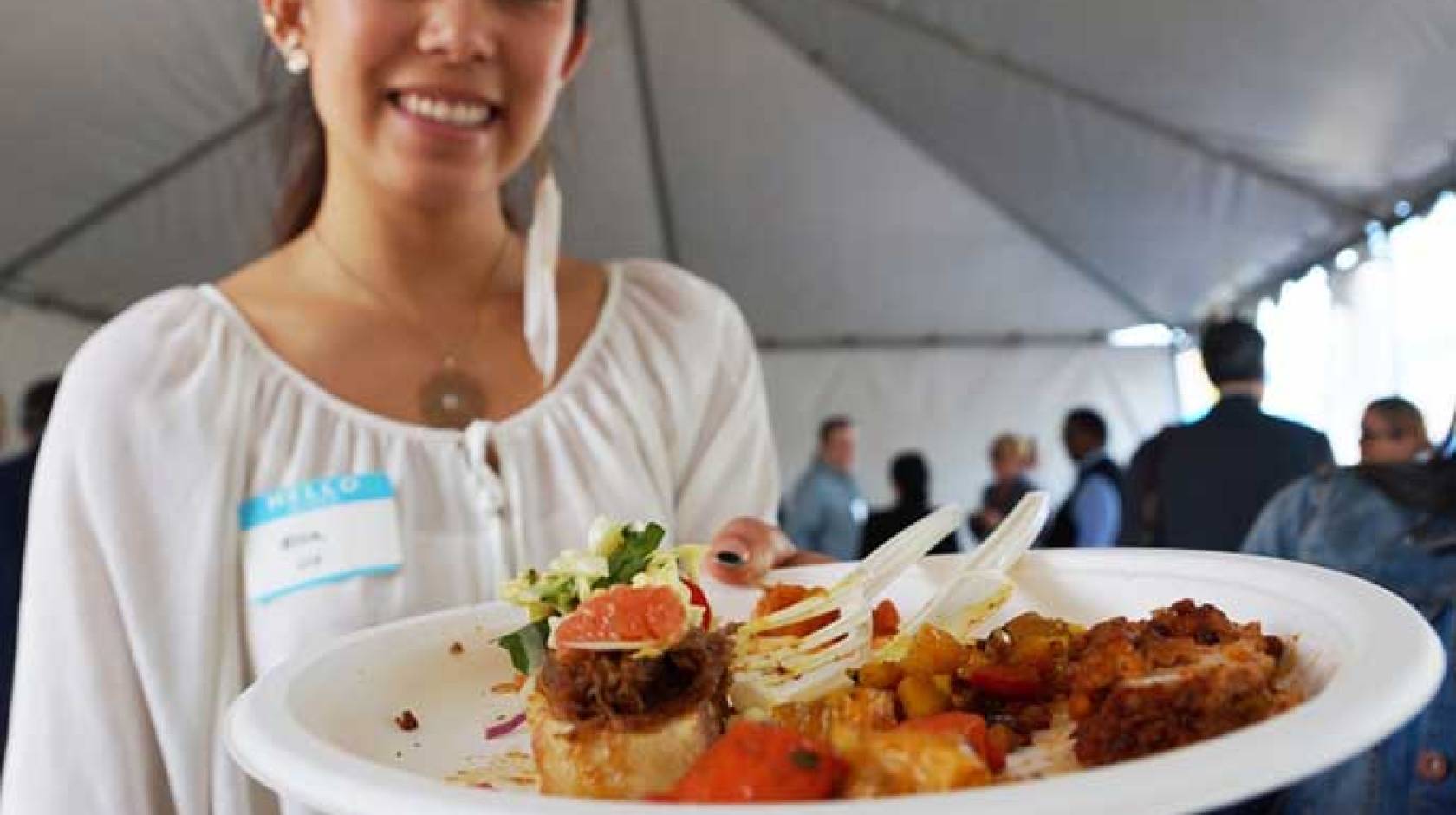Shelly Leachman, UC Santa Barbara

It was a scene straight out of any reality television contest. Four teams of chefs spread across mobile and outdoor cooking stations — moveable cooktops, multiple grills, a pantry on wheels — with the timer set at 90 minutes. Working with market baskets of prescribed, “must-use” ingredients, each team crafted three dishes for a four-course tasting menu to be served to a crowd of invited guests.
The only thing missing from this competition was, well, competition. No one had to pack their knives and go from this party. The foodie festivities at UC Santa Barbara were all in the name of good fun — and good eats.
“We just thought they’d all enjoy cooking together — and we knew people would enjoy tasting the results,” said Jill Horst, UCSB’s director of residential dining, whose staff hand-picked 20 student diners from entrants in an Instagram food photo contest.
The collaborative activity was the centerpiece of a robust menu of events for Pacific Chef Net 2015, a regional gathering of university chefs put on by the National Association of College & University Food Services (NACUFS). UCSB hosted the conference for the second time.
For three days, three dozen chefs representing 14 institutions from Washington state to Orange County gathered to dish on food and kitchen trends, swap stories and ideas, attend demos and presentations on subjects from poultry preparation to food truck technology and, of course, to cook.
No more 'mystery meat'

Credit: Sonia Fernandez/UC Santa Barbara
As he grilled bacon and rehydrated raisins for a vinaigrette to dress a kale and persimmon salad, Joshua Trovato, an assistant kitchen manager for residential dining at University of Southern California, characterized the conference as “remarkable.”
“I didn’t know what to expect, but this has been amazing,” said Trovato, who joined USC last summer after working restaurants in New York City and Australia. “UC Santa Barbara has been very welcoming, opening things up for us. It’s a lot of fun being here and connecting with other university chefs. Restaurants are crazy, hustle and bustle, minute to minute. Residential dining is different. It’s three thousand kids a day. They’re hungry, they’re paying for it, and they deserve just as good as they get in the restaurants. And we give it to them. There is a misconception that school food is cafeteria food and not as good. That’s wrong.”
No kidding.
From open kitchens and artistic plate presentation to sustainable seafood, local produce and organic everything, university dining has evolved in a major way. The cafeteria days of yore — mystery meat, bland vegetables and grease galore — are dead. And yesterday’s lunch ladies are today’s top chefs.
Foodie culture goes to college
The culinary culture and food trends playing out in restaurants and on television are thriving as much on college campuses as anywhere else, if not more so. Kids who have grown up going to restaurants and, quite likely, watching shows like “Chopped” and “Iron Chef” are coming to school with the appetites — and expectations — to match.
“Students today have a very educated palate and we need people who are trained professionally,” said Horst, also a culinary school-trained chef, who worked in restaurants and resorts before joining UCSB. “The industry has really changed. We’re just like a gigantic restaurant now. We batch cook, we use seasonal ingredients, our menus change regularly. The food and the staff are top notch.
“Many chefs are switching from the restaurant world to college and university foodservice because the quality is still there, the education and training are still there and the level of food that we’re producing is just as good as any restaurant,” Horst added. “It takes the same knife skills and cooking methods, the same knowledge and experience to produce food here as it does in resorts and restaurants.”
Over the course of the NACUFS conference, the chefs toured UCSB’s award-winning dining facilities, visited the Santa Barbara downtown farmer’s market and met with local produce distributor Harvest Santa Barbara. They saw demos on whole grains and cold salads, ramen and pork butchery and heard a history of California olive oil. They also got an overview of the UC Global Food Initiative, an effort to coordinate the diverse resources of the University of California to help ensure adequate nutrition and food access for all.
Peer influence
“It’s been great to hear what other universities are doing, whether it’s things that are new or have been working for them for years,” said Joshua Heffendorn, an executive sous chef for UCLA catering. “I like seeing all of it and how it works, and seeing the people and interacting. We’re all chefs here. It’s good to be with your peers and see what they’re doing. It raises your game in terms of what you want to execute. I relish these opportunities.”
He’s not the only one.
The diners invited to taste the chef’s creations at the team cooking event were doing a bit of relishing themselves.
“The wonton appetizer with shitake mushrooms and cream cheese? Amazing,” said Samantha Chavez, a first-year Gaucho who attended on the invitation of her friend, fellow freshman and Instagram contest winner Karla Jerez. “Also the pulled pork, oh, and the turkey-fennel salad. It’s all really, really good. Really. My friends are all so jealous that Karla chose me to come.”

